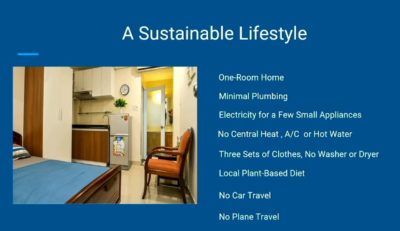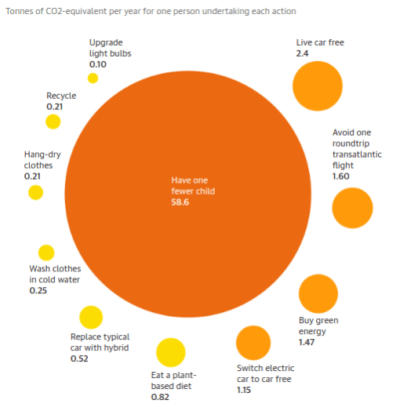“Questioning the ostensibly unquestionable premises of our way of life is arguably the most urgent of services we owe our fellow humans and ourselves.” – Zygmunt Bauman, in Globalization: The Human Consequences (2000)
A couple of years ago, while studying for my Masters, I attempted to run what most would consider being an almost intolerable and excessive experiment of human behavior. The word ‘excessive’ acquires sort of a double entendre here because at the core of that volitional operation stood a renouncement of an array of extravagant routines. The aim of this undertaking, I thought to myself, would be to reveal that the dominant narrative of reductions in consumption to attain the desirable sustainability nirvana, was not only quixotic but close to delusional. Also, as a student one is always living with a tightened belt, so being even more frugal and saving for that rainy day (when it could really leak inside that small one-room apartment) could be said to be appreciated.
I had become increasingly aware of the inconsistencies of modern lifestyles in the overdeveloped world and what was coming out of the literature as contemplated to lead to sustainability. It didn’t take me long to understand that these were two completely distinct realities and that the chances of anyone, voluntarily embracing such conducts could only be imagined to occur in an alternate reality. Owing to this, I restructured the purpose of the trial, so I could answer the following line of inquiry: “How far would a highly-motivated individual go in the attempt to lead a sustainable lifestyle?”
It would follow that if I couldn’t commit myself to the required remodelling of my affluent demeanour, one could reason that the general populous – to whom environmental and ecological concerns are nothing short of extraneous rumours – would definitely not hold on or even support such transitions for long. Therefore, to put our faith in the repeated incantation of cutbacks in per-capita consumption as the primary approach to guarantee the survival of our civilizational project and of the species itself would look like nothing short of pure madness.

Looking at the lifestyle requirements mentioned above, I already had the one-room home with minimal plumbing, so that was taken care of. Electricity was only used to power two light-bulbs in the room; to recharge the PC and for a compact fridge. I did not own a personal cellphone for almost two years, which coincided with the experiment. Central heating or A/C were out of the question, consequently for elevated temperatures a window was used, and blankets took care of lower ones. The hot water was the cruelest and challenging part, mainly because I ran the experiment during peak winter. As a result, the showers were short and painful, and there were definitely no singing or ‘Eureka! moments’ during that period. To lighten the mood of such a deliberate gruesome adventure, some subtitles were added.

Since I wasn’t already using hot water, I decided to save up more money and cut the supply of natural gas, doing away with cooking. I made an arrangement with a local vegan restaurant and got all my meals from there. Instead of just exporting my footprint somewhere else, I went to great trouble to find an environmentally-conscious business that prioritized getting their supplies from local sources (these businesses do help, but they won’t solve the problem). Financially speaking it didn’t cost me more since I made a simple agreement with the owner and guaranteed to that person that they would have a loyal costumer every day if they could lower the price and expand a little bit more on the size of the portions. Both sides came out winning, and I have since become an aficionado of the vegan cuisine.
The limited personal attire I must say was barely an inconvenience. It helped that I’m not fond of shopping for clothes myself, but it goes without saying that going on a spending spree during sales season will be a thing of the past. Additionally, the life of a student isn’t exceptionally physically demanding, so the restriction in clothing was more comfortable to achieve (compared with the previous ones). Doing sports complicated the situation, but washing the clothes by hand and hang-drying them was still feasible and not very strenuous. I did have to get an iron machine, so that is another appliance that needs to be added to the list.
I have owned a personal vehicle for a decade now, and as a result, one grows accustomed to the convenience of this readily available method of transportation. However, the goal of this undertaking was to lay aside every lifestyle choice deemed superfluous when there were other non-life-threatening alternatives available. For this purpose, I took myself to travel by long-distance bus to make the home-university city journey, while making the daily commute on foot. The bus rides were longer than 2h, and usually, the vehicle would be reaching maximum capacity, which was a far cry from the peaceful and relaxing car trips. Still, it had significant upsides besides the carbon footprint savings, such as more time to listen to podcasts, the immunity to getting speed-tickets and the occasional slumber. The footwork was all the more welcome.
‘No plane travel,’ quite possibly the worst one for the generation EasyJet, dependent on frequent low-cost flights to fill those weekends, vacations and the emptiness in their hearts that apparently only ‘likes’ and ‘views’ on Facebook and Instagram can satisfy. Fortunately, I don’t share this need to travel the world regularly, therefore it was effortless to cut this one out. Lately, I have contentedly embraced the anti-flying movement and have written about the ethics and worrying trends relative to air travel.
Finally, something that is not included in the picture above but that is definitely pivotal in the sustainability lifestyle issue. One’s annual income. A study published in the journal Nature Sustainability examined what would take to lead a good life within planetary boundaries, and they concluded that humanity would have to live as the average inhabitant of Morocco, Guatemala or the Philippines. In regards to income alone, the contrast is immense. The average in these three countries of annual income is between 3000-5000 dollars, while in the United States that rises to about 55000 dollars. What I noticed with this experiment is that while my objective was to attempt to become more abstemious, all my peers and friends were striving for precisely the opposite. In effect, it is the mark of the ‘20s and ‘30s for one to not just gain financial independence but climb the affluence ranking. Contentment for one’s present financial condition is often perceived almost like a mental disorder, and yet, it should be a necessary element if humanity is serious about its sustainability commitments. The message is clear if one wants to reduce its carbon emissions, the answer is not to want to be rich.
Still and all, it is not the best answer. Voluntarily choosing to reduce one’s desired family size is, without a doubt, the most effective action the individual can commit to. As the comedian and political commentator Bill Maher said a few years ago: “You could do it all, you could get a hybrid car, do the recycling, and not throw batteries in the trash. It all adds up to a fraction of the good it would do to have just one less child.” It goes without saying that even if an individual were to endure the personal abnegation and immolation so far described, opting not to reproduce or embrace a small-family model is undoubtedly the best course of action, and the one least referenced by environmentalists.
Lamentably, I had to shut down this entire operation. I can say, with some hint of pride that I held out for 6 months in this routine and that I haven’t ostensibly changed my lifestyles (the hot-water had to be included). Either way, it helped me see more clearly the depth of the problem in our hands.
To point out, last year when speaking at the “The Many Faces of Migration” conference in Warsaw, the expected line of reasoning was used. That is to say, we shouldn’t waste too much energy on human numbers but instead on reducing per-capita consumption patterns, or the new fashion of disavowing one’s responsibility as a consumer by blaming it on the evil capitalistic companies that sold the world for profit. By all means, they still did that, but we are still all co-conspirators since we all buy their products or participate in the civilizational project, which is highly dependent on fossil fuels, and won’t cease to be so anytime soon.
As my patience for these worn-out arguments wore thinner, I saw it as a moral responsibility to set the record straight and for the first time share my experience with those conveniently echoed reductions and blame games. As I described what a real sustainable lifestyle would look like, and the sort of adjustments needed, I could see the eyes of my audience growing wider at the thoughts of what they would have to relinquish and what kind of deranged animal they had given a platform to, one that would even attempt such a feat.
Between some nervous laughter, the approach to cope with such information is to deny it altogether. Could we blame them? The reality is that we are being sold this mainstream narrative that if we just stop using plastic and recycle a bit more, each of us is doing their share for the environment. Not to mention the efforts of nations and governments to come together on an annual basis in venues such as Davos or the United Nations Climate Change Conferences which give off the impression that someone, somewhere is taking care of things for us, so that we can continue to enjoy our holidays and going shopping. They are most certainly not since carbon emissions continue to rise; deforestation persists unabated; unsustainable levels of fishing linger; more species than ever are facing extinction at the hands of humanity; and climate change is most likely already out of anyone’s ability to control, leading to a plausible scenario of civilizational collapse in the coming decades.
Given these points, it is inescapable that we ask ourselves if all of us can go on maintaining voluptuous, epicurean and hedonistic lifestyles with complete impunity while it is expected that purist sustainability advocates endure this lifestyle to practice what they preach. Alternatively, could someone who is outspoken about these issues, who goes to every protest and march, recycles, has solar panels, bikes to work and has a plant based diet, but then goes for a holiday across the world, has a big family or can’t resist being a part of the consumer culture be considered to be paying the price for their accommodation on this planet? Can we even live up to the challenge when we take into account the words of population ethicist Karin Kuhlemann, who said:
“All human beings engage in at least subsistence level consumption, and virtually all either already consume more than required for survival or would if given the opportunity.”
In any event, I can personally attest that despite the inherent difficulties associated with living a truly sustainable lifestyle, it wasn’t as bad it might seem. Although one has to scale down or even phase out many expendable practices, I did however have the means to keep tabs on world events, to cultivate my mind by ways of reading, learning about art and poetry, going into museums, climbing mountains with my dog and spending time alone in secluded areas etc. We do end up sacrificing things, but those are the redundant and irrelevant things that we do end up realizing we can do without, just as Oscar Wilde wrote:
“We live in an age when unnecessary things are our only necessities.”

João Abegão has a BS in Environmental Health, a Masters in Ecology and Environment and is currently applying for a doctoral program in “Sustainable Development and Climate Change” and plans to focus his studies on overpopulation. His interest in Human Overpopulation arose from literature like Life on the Brink – Environmentalists Confront Overpopulation and authors Jeffrey McKee, Dave Foreman, Eileen Crist, Albert Bartlett, Lester Brown, Alan Weisman, Karen Shragg, and many others whose contributions inspired João to write his own Human Overpopulation Atlas. João plans to continue researching, writing and advocating on human overpopulation and its many implications for the future.
The MAHB Blog is a venture of the Millennium Alliance for Humanity and the Biosphere. Questions should be directed to joan@mahbonline.org
The views and opinions expressed through the MAHB Website are those of the contributing authors and do not necessarily reflect an official position of the MAHB. The MAHB aims to share a range of perspectives and welcomes the discussions that they prompt.
